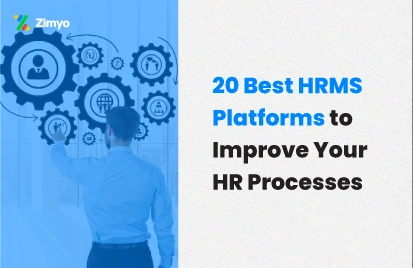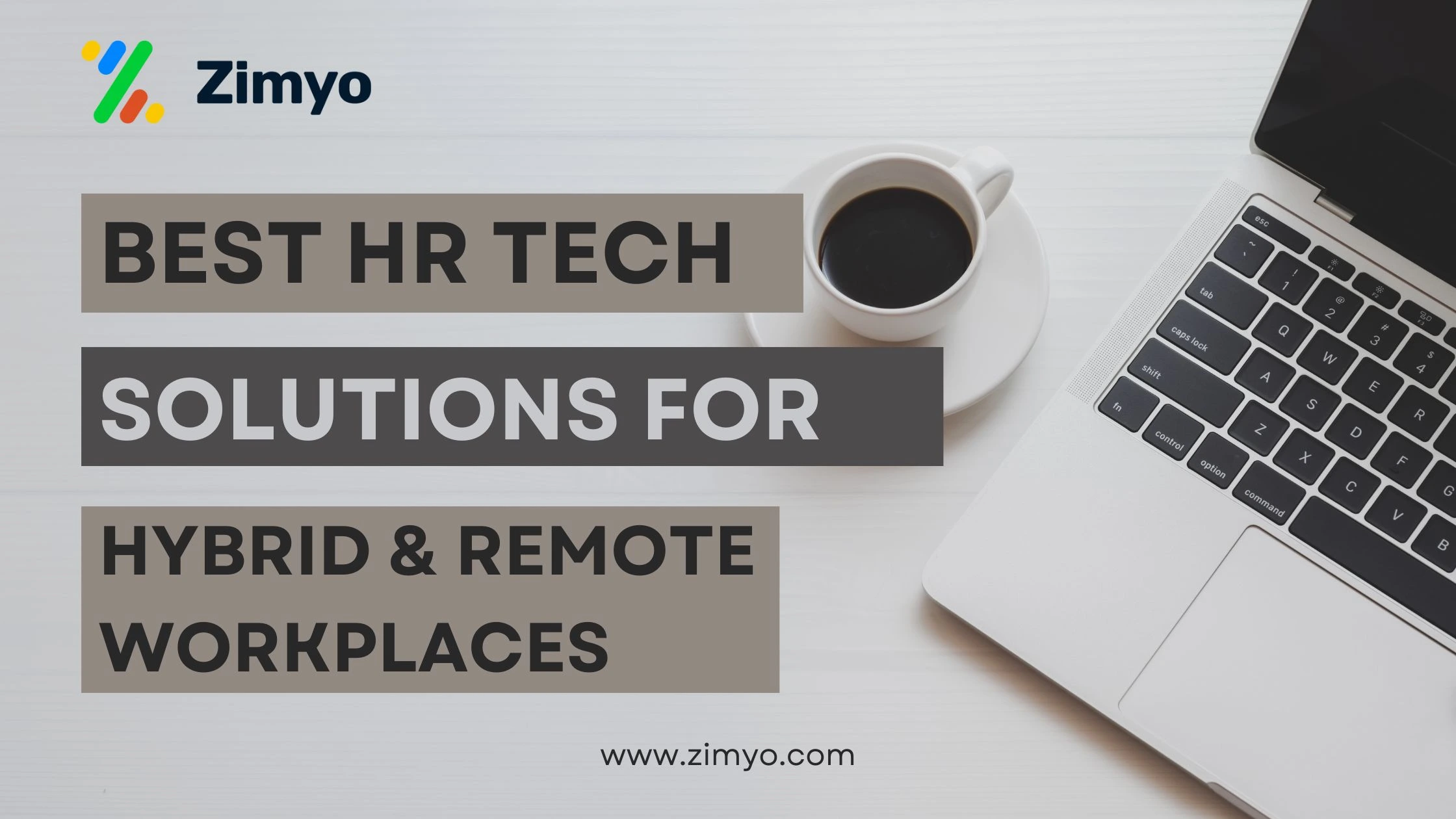What is HRIS?
HRIS stands for Human Resource Information Systems. This software aids in managing the daily activities of an HR professional in an organization. It streamlines the manual activities of HR within an organization, providing accurate data and insights to make crucial decisions. By reducing paperwork, organizations can save valuable time for more productive activities.
Furthermore, HRIS benefits organizations by enabling data-driven decision-making rather than relying solely on assumptions. It assists businesses in planning their costs by allocating resources efficiently and effectively. Businesses are gradually transitioning to HRIS to cut costs and enhance overall efficiency. It proves to enhance business efficiency by making proper and calculated decisions. HRIS not only benefits the organization but also helps to increase employee productivity in the long run.
Features of HRIS Systems
HRIS offers several solutions to streamline various manual tasks in an organization. It helps to tackle several business challenges as it moves towards growth and expansion in the long run.
Some of the most common features of HRIS Systems are:
1. Recruitment Management
HRIS helps HR professionals or recruiters manage the entire recruitment cycle of an employee in an organization. Recruitment involves several processes before a candidate is finally hired for a specific job role. It includes resume parsing, interview scheduling, candidate screening, and conducting various profile checks. HRIS assists in streamlining these manual processes that consume a lot of time and effort from HR professionals. The recruitment process is continuous in an organization. Having a clear structure for recruitment management not only benefits organizations but also builds the brand image of the organization in the market.
2. Time and Attendance Management
In every organization, it’s necessary to maintain the time and attendance of every employee. Managing employee attendance on Excel sheets is quite time-consuming and tricky, especially when the number of employees is large. In this situation, HRIS systems play an important role. They help manage the time and attendance of employees in the organization with just a few clicks, thereby saving a lot of time and manual effort. Moreover, an employee can apply for leave, on duty, and work from home through their self-service portal.
3. Performance Management
It’s necessary to measure the performance of the organization to ensure its success in the long run. The overall performance of an organization depends on the performance of its employees. Therefore, it’s crucial to measure the performance of employees through various parameters such as OKRs, KPIs, etc. HRIS helps organizations manage employee performance. These performance measures play a crucial role in every organization. If an employee is performing exceptionally well, the organization can provide them with incentives or bonuses. If any employee is underperforming, it’s necessary to provide them with training and guidance.
4. Data-driven insights

HRIS provides data-driven insights that are useful in making core decisions in organizations. Previously, core decisions were made by organizations on an assumption basis, leading to errors and wasted efforts. However, data-driven decisions prove to enhance the efficiency of the organization and facilitate the right use of resources. This data is also valuable for management and stakeholders to make crucial decisions.
5. Employee Self-Service Portal (ESS Portal)
The Employee Self-Service Portal is an essential tool for employees to manage their leaves, attendance, apply for duty, review their performance, and raise various requests. It is a very convenient tool for employees, accessible on both smartphones and the web, reducing their dependency on HR professionals. ESS also assists in managing the important documents of employees. It also helps administer employee benefits, including salary advances, loans, etc.
6. Feedback and Survey Management
In any organization, the viewpoint of employees is necessary to make better decisions. HRIS plays an important role in collecting feedback and managing employee surveys with just a few clicks. It also helps in strengthening the relationship between the employees and the management. This makes the workforce more engaged and motivated to perform better.
How does HRIS drive business growth?
Various factors state the way HRIS drives business growth in the long run. Here are some ways in which it drives business growth:
1. Enhances employee satisfaction and engagement
HRIS plays a crucial role in improving overall employee engagement and team-building. According to a recent study, satisfied employees are likely to be more productive and motivated in their work. Employee engagement in organizations is becoming increasingly crucial. Frustration among employees decreases when they can easily apply for leaves and mark their attendance, leading to greater satisfaction.
2. Improves overall productivity
Employee productivity is a key factor in determining whether the organization is on track or not. Automating various manual tasks, such as leave and attendance management, compensation management, and recruitment management, through HRIS, contributes to the overall increase in employee productivity. This automation also results in significant time savings. Additionally, employees can submit various requests through their Employee Self-Service (ESS) portal.
3. Data-driven decision making
HRIS provides data and insights that play a crucial role in making important decisions. Decisions backed by proper data insights and analytics are more reliable than those based on assumptions. Moreover, HRIS reports also assist stakeholders and management in analyzing the growth report and making strategic decisions if required.
4. Reduces time and manual efforts
HR professionals have numerous tasks to handle. Performing each task manually consumes a significant amount of time and manual effort, often leading to errors. HRIS helps mitigate these manual errors and improves overall efficiency. Additionally, it reduces manual efforts, allowing professionals to focus on more strategic tasks in the organization that require careful attention.
Streamline your global workforce!
Future of HRIS
The future of HRIS appears promising and continually evolving for organizations and businesses worldwide. People are increasingly embracing technology to reduce manual efforts and save time, fundamentally altering traditional business and organizational operations. HRIS not only enhances efficiency and operations but also boosts the effectiveness and productivity of employees. The momentum of HRIS is growing and expanding with each passing day, prompting organizations to move away from traditional Excel sheets and adopting HRIS.
The surge in the startup trend is amplifying the global use of HRIS, with startups striving for daily growth. This necessity stems from the need to automate routine manual tasks, a crucial requirement for startups aiming to streamline their operations. The HR department holds a pivotal role in the growth and development of any organization as it oversees the entire workforce. Given the ongoing shift towards automation and efficiency, businesses worldwide are increasingly adopting HRIS.
Choosing the right HRIS for your organization
Selecting the most suitable HRIS software for your organization requires careful consideration of several key factors. Here are some essential pointers to keep in mind before making a decision:
1. Budget consideration
Before deciding on an HRIS, it’s crucial for an organization to assess the budget it can allocate. The budget plays a pivotal role in determining the HRIS that aligns with the financial capacity of the organization.
2. Compliances
Ensuring compliance with local rules and regulations is imperative for every organization. Prior to selecting an HRIS, it’s essential to verify its compliance with local laws to avoid any legal complications. Choosing software that aligns with local regulations is crucial.
3. Need for HRIS
Organizations sometimes may be uncertain about their need for an HRIS. It’s essential to thoroughly understand the actual requirements of HRIS within an organization. Factors such as employee count, organizational scale, and revenue should be considered when assessing the need.
4. Fulfilling the needs of the organization
Before settling on an HRIS, organizations should evaluate whether the chosen system will fulfill their specific needs. An ideal HRIS should offer features like time and attendance management, recruitment management, performance management, and an employee self-service portal.
5. Market Evaluation
Assess the variety of HRIS software available in the market before making a decision. This broadens the choices available to the user, allowing for a more informed decision. Selecting an HRIS system that is compatible with organizational requirements is crucial.
6. Integrations
The HRIS system should seamlessly integrate with other existing software used in the organization. This includes integration with biometric devices, job posting platforms, and other relevant tools. Integration facilitates the smooth implementation of the HRIS within the organization.
Go Paperless with the HRIS Experience!
FAQs (Frequently Asked Questions)
HRIS stands for Human Resource Information System. It helps businesses to streamline the daily HR tasks in an organization, thereby reducing manual efforts and saving a lot of time.
HRIS plays a crucial role in any organization. It provides data-driven insights to manage workforce planning, talent acquisition etc.
One of the most important feature of HRIS is ESS or Employee Self Service Portal. It helps employees to manage their leaves, time and attendance etc.




